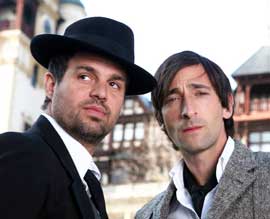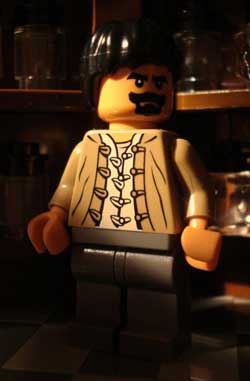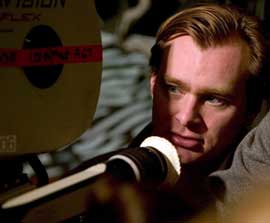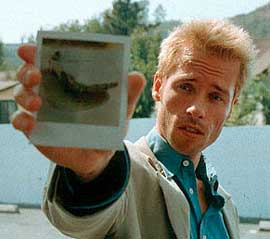
What is the kid from Third Rock From the Sun doing in my dream?
First off, I must apologize for being the last person on the internet to consider that Inception may be an elaborate metaphor for filmmaking. Last week I was reading Perich’s great piece on the cost of an inception when it suddenly occurred to me, “Hey, Cobb is kind of like a writer/director! Oh boy, wait until all the kids on the Internet get a load of this!” Then I read Shana’s also great article on Monday, in which she not only makes this argument quite elegantly, she points out that “basically any article on the Internet about Inception” points this out. [Makes embarrassed Rodney Dangerfieldesque collar-loosening gesture.]
But if Inception taught me one thing, it’s that when you run into trouble, you don’t retreat; you go deeper. So first let me rehash the apparently-obvious-but-still-new-to-me idea that performing an inception is like making a film, and then address the trickier question of what that means.
Inception is basically a heist film, like Ocean’s Eleven minus the Elvis and Sinatra. A team is assembled, a plan is conceived, security measures are dealt with through force and cunning, the plan is revised on the fly, and the team escapes in the nick of time, splitting up until the next job. But Cobb’s goal is not to steal anything. It’s to bring about a life-altering emotional catharsis, Good Will Hunting-style.  So imagine if the Matt Damon of Ocean’s Eleven was the therapist for Matt Damon in Good Will Hunting, and you get the picture. Except wait, the catharsis they are trying to induce in Fischer is based on total lies. So imagine if, contra Robin Williams, it actually WAS all Will Hunting’s fault, but the degenerate liar Matt Damon of The Talented Mister Ripley decides to trick him into an emotional breakthrough, and hires the Matt Damon of Ocean’s Eleven as the Forger and the Matt Damon of The Bourne Identity to provide some muscle, because you just know Will Hunting’s subconscious is going to involve all sorts of dudes with Red Sox caps and lead pipes.
So imagine if the Matt Damon of Ocean’s Eleven was the therapist for Matt Damon in Good Will Hunting, and you get the picture. Except wait, the catharsis they are trying to induce in Fischer is based on total lies. So imagine if, contra Robin Williams, it actually WAS all Will Hunting’s fault, but the degenerate liar Matt Damon of The Talented Mister Ripley decides to trick him into an emotional breakthrough, and hires the Matt Damon of Ocean’s Eleven as the Forger and the Matt Damon of The Bourne Identity to provide some muscle, because you just know Will Hunting’s subconscious is going to involve all sorts of dudes with Red Sox caps and lead pipes.
Feel free to write up that fan fiction, by the way.
So Cobb’s not after money. He has to figure out what Fischer wants more than money, and then pretend to give it to him. Cobb’s main gift is his psychological insight: before he ever meets Fischer, he figures out how to make him break up his father’s business, a decision that seems utterly irrational.  (For those lucky few of you who caught Rian Johnson’s The Brothers Bloom, you’ll see a lot of similarities between Mark Ruffalo’s character and DiCaprio’s. In Bloom, Ruffalo’s maxim is, “The perfect con is one where everyone involved gets just what they wanted.” After one of the Bloom Brothers’ cons, the mark doesn’t feel robbed; he feels blessed.)
(For those lucky few of you who caught Rian Johnson’s The Brothers Bloom, you’ll see a lot of similarities between Mark Ruffalo’s character and DiCaprio’s. In Bloom, Ruffalo’s maxim is, “The perfect con is one where everyone involved gets just what they wanted.” After one of the Bloom Brothers’ cons, the mark doesn’t feel robbed; he feels blessed.)
But comparing Cobb to a traditional con man doesn’t really capture the scope of his job. A con man can play a character, plant forged documents, or many even cobble together a location that doesn’t exist. But Cobb can literally create a whole new world. Not only does he determine how he wants his target to feel, not only does he invent a story to inspire these feeling, but he also supervises the creation of an environment (several environments!) in which his story will unfold.
You know what job I just described? Christopher Nolan’s. Now is when I would poke around the internet for a picture that shows the physical similarity between the director and his leading man, but Shana already found it for me.

So if Cobb is the writer-director, who is everyone else? Well, Arthur is clearly the producer. He does all the research, takes care of the logistics, and puts together a team to fulfill the director’s vision. He understands both the technical aspects and the storytelling aspects of the work, as all good producers do. And just as most directors work with the same producer again and again, Arthur and Cobb are a team.

I really need this t-shirt.
Saito is the studio executive. He finances the inception – which is basically a work of art for an audience of one – because he thinks it will make him money. This studio executive has the good sense not to rewrite the script or tell the director how to do his job. And as Perich pointed out, Cobb’s “movie” has a virtually unlimited budget. I’m sure not even Christopher Nolan has executives willing to buy him airlines, so this might be wish fulfillment on his part. (On the other hand, when Cobb fails, the executives that hired him may try to have him killed. Hollywood is a rough town.)
Unfortunately, Saito does insist on tagging along for the “shoot,” and he pays a price. I can’t help but see Saito’s injury and imprisonment in limbo as Nolan’s little dig at meddling “suits.” He can’t work without them, but they should sign the checks and keep their distance.
Eames, of course, is the actor. He pretends to be someone else, and he tries to get certain reactions out of the audience. Ariadne is the production designer. Cobb tells her what he wants the world to look like, and she creates the “set” for his drama.

And this lego Yusuf.
Yusuf is the only one who doesn’t have a clear analogue in the filmmaking world. But I’d say he’s the Special Effects department. The process of inception, like filmmaking, is a technical challenge as well as an artistic one. I’m sure when Nolan decided he wanted to film parts of The Dark Knight in IMAX, he needed to find someone like Yusuf, who was willing to try something that had never been done before. And I’m sure Nolan’s producer, like Arthur, initially fretted that it was impossible. Of course, Inception itself is a technically demanding movie. If Yusuf really represents Special Effects, it’s a nice poetic touch that he’s literally at the wheel during the movie’s trickiest effects scene, Arthur’s hallway fight in shifting gravity.
Here’s where Shana and I start to disagree. She argues that if the movie is meant to perform an inception on its audience, it failed.
Is the ultimate moral of Inception that movies and dreams are similar in various ways? But that can’t be right. According to Cobb’s exposition throughout the film, an inception is successful when the dream-trapped target adopts an idea from an external source as his own and then—here’s the important part—changes his or her behavior based on that idea. In other words, a proper inception affects the target’s behavior, not just his or her thoughts.
I totally get why she feels this way. But I think she’s putting too much emphasis on the subject changing his or her behavior. Yes, that’s why people attempt an inception, because otherwise why would you bother doing something so difficult and risky? But that’s the motive; that’s not the definition. A successful inception, to me, is when you put an idea in someone’s head that they just can’t stop thinking about. I’ll let Cobb explain it, in one of his first lines:
What is the most resilient parasite? Bacteria? A virus? An intestinal worm? An idea. Resilient. Highly contagious. Once an idea has taken hold of the brain it’s almost impossible to eradicate. An idea that is fully formed, fully understood: that sticks.
And now let me point something out. I’m currently writing thousands of words about Inception. Shana did the same thing earlier this week. Perich did it the week before. And this movie came out more than eight weeks ago. If Inception is one thing, it’s thought-provoking. It makes you think, probably for years to come. If that’s not a successful inception, I don’t know what is. Sure, no one ever cried while playing a Rubix cube, but how many billions of hours have been spent trying to unlock its secrets?
 If you use a dream machine to put an idea in someone’s head and it sticks with them, it’s a successful inception. If you use a camera, it’s a successful movie.
If you use a dream machine to put an idea in someone’s head and it sticks with them, it’s a successful inception. If you use a camera, it’s a successful movie.
So if that’s true, what does it tell us about how Christopher Nolan views his profession?
First of all, recall that performing a successful inception is widely thought to be impossible within the movie. “The subject’s mind can always trace the genesis of the idea,” says Arthur. “True inspiration’s impossible to fake.” To use the filmmaking metaphor, this would be like if no one had ever been emotionally or intellectually moved by a film, because viewers were always aware the characters were actors, the sets were just plywood, and the plot was just something a writer cooked up beside his Beverly Hills pool. (Cobb, of course, has pulled it off, which makes him/Nolan the greatest filmmaker ever.)

Raise your hand if you're kind of jealous of this stunt man.
However, I don’t think Nolan is trying to imply that no one has ever produced a film that an audience liked. I think he’s just saying that, in Eames’s words, “it’s bloody difficult.” This is because a film is a series of pictures projected on a screen, cobbled together over the course of months in various locations, according to a script written by one dude over the course of many years. There are levels upon levels of artificiality that the filmmaker needs to hide and overcome in order to reach his goal. “With the slightest disturbance,” Arthur says, “the dream’s going to collapse.” Note also that the more ambitious the inception, the more unstable the whole thing is. To translate that, a complicated movie is easier to screw up than a simple movie.
(You know what I suddenly realized? Remember the scene where Cobb tells Yusuf he wants the dream to have three levels, and everyone thinks it’s impossible? I promise you that at some point in 2007, Christopher Nolan told people he was writing a movie with a dream that had three levels, and they told him it was impossible.)
Now, consider the twist that Fischer’s mind has been trained to detect and reject inception. This is a great metaphor for how media-savvy we’ve all become. Consider how many movies we’ve seen, how many thousands of hours of visual storytelling we’ve been exposed to. We’ve got every trick in the filmmaker’s arsenal memorized, and we roll our eyes at the first sign of cliche. Just as Cobb’s team has to literally fight its way through Fischer’s mind, Nolan feels he’s up against an audience that has built up a resistance to storytelling. The only way to do something original is to do something drastic.

Just call him Mr. Charles.
So what is Cobb/Nolan’s solution? He disarms the audience by pointing out the artificiality of the dream/movie. Cobb pulls the “Mr. Charles,” in which he straight-up tells Fischer he’s in someone else’s dream. Nolan did pretty much the same thing in Memento. That’s a movie in which a relatively simple story was edited to move back and forth through time. It was deliberately artificial and confusing, and the Arthurs of the world probably thought it would destroy any chance of the audience connecting with Leonard. Instead, the editing is indispensable to the emotional impact. That’s kind of what the Mr. Charles is – it makes the fakeness of the medium part of the plan to draw the audience further in.
I’m sure these observations have been made before – like Shana said, the inception-as-filmmaking angle is sort of low-hanging overthinking fruit. But here’s something that throws a monkey wrench into the whole thing: an inception is a goddamn horrible thing.
An inception is way worse than stealing from someone. It’s a kind of psychic rape. You are entering someone’s subconscious without their permission, and changing them in a permanent way. And the worst part is, you’re doing it without their knowledge. To perform an inception on someone is to corrupt their free will and destroy their integrity as a human being. The two people it is done to, Fischer and Mal, move on with their lives assuming they are in full control. But they’re just puppets, being manipulated to their own destructions.
Take another look at Cobb’s opening line:
What is the most resilient parasite? Bacteria? A virus? An intestinal worm? An idea. Resilient. Highly contagious. Once an idea has taken hold of the brain it’s almost impossible to eradicate. An idea that is fully formed, fully understood: that sticks.
Does this sound like a guy who thinks inception is a good thing? Inception is secretly implanting a parasite inside someone that they can never get rid of. That’s what is so shocking about Cobb’s big secret: “I did it to my own wife!” His motives were good, but it doesn’t matter. It’s an unforgivable betrayal. Even if she hadn’t killed herself, he still should have felt like a monster.

Do you know some people spend three hours with the dream machine EVERY DAY? Unthinkable!
And it’s not only horrible to perform an inception/make a movie; it’s horrible to willingly subject yourself to one. When Cobb meets Yusuf for the first time, the chemist shows him a room in which 12 people are hooked up to the same dream machine. You and I know this room as a “movie theater.” Yusuf says the people do this everyday, for 3-4 hours. “The dream has become their reality,” someone tells us. “Who are you to say otherwise?” I think the characters, and the audience, have a mixture of horror and pity for those people. And yet, they’re clearly supposed to be us, watching God knows how many hours of TV each day. I can’t help but see this scene as a rebuke to Nolan’s own audience (complete with Yusuf giving one of the dreamers a hard slap to show what vegetables they are).
Moreover, it’s repeatedly said that if you spent too much time using the dream machine, you lose the ability to dream any other way. If I interpret the filmmaking metaphor correctly, Nolan is saying that when we watch too many movies, it chips away at our ability to imagine things for ourselves. He’s suggesting we’d be better off watching fewer movies and spending more time with our kids.
So if I was going to follow this argument to its logical conclusion, I’d now tell you that clearly, Christopher Nolan has to come hate making movies. He really just wants to spend time at home (he has three small children) instead of inventing imaginary worlds. Making the movie Inception gave him enough money to do this, and now we’ll never see him again.
But I’m pretty sure Christopher Nolan does not hate filmmaking. So we have three statements to reconcile:
- Inceptions are a metaphor for the movies.
- Inceptions are horrifying and morally repugnant.
- Christopher Nolan does not think that movies are bad.
It seems that Christopher Nolan is using the movie to imply that movies are a bad thing, which we know he doesn’t believe. Hmm. You know who ELSE tries to convince someone of something which isn’t true? Cobb.
Did I just blow your mind? Want me to make the noise? Fine, just once:
 BURRRRRRRRRRRRRRRRRRRRRRRR.
BURRRRRRRRRRRRRRRRRRRRRRRR.
It’s time to invoke Cobb’s Law: Christopher Nolan is performing an inception on the audience. He’s planting a simple idea way down in our subconscious. The idea is this: making movies is bad, and watching movies is bad. And why is he telling us this lie? Because he fears competition. He’s afraid that a new generation of filmmakers will rise up and destroy what he’s built, and so he’s created something which will kill our ambition to do what he does.
[cracks up]
I’m kidding. But it’s pretty cute, right?
Okay, seriously, what is going on? Well look, it’s entirely possible that not every detail of inceptioning maps onto filmmaking. For instance, just because the three levels of the dream Cobb plans out seem to mimic the three acts of a traditional screenplay doesn’t mean that filmmaking must also be a form of corporate espionage.

Three of the actors who played Cobb's kids. I hope no one let them watch this movie. It will, ironically, give them nightmares.
But my theory is that the movie does contain a gentle warning about the dangers of spending your whole life lost in films and TV shows, but that doesn’t mean films and TV shows are all bad. The people who spend every day in Yusuf’s basement are taking it too far. Cobb and Mal are taking it too far when they get stranded in Limbo for a lifetime. But we can’t forget about the scene where Ariadne learns to control dreams for the first time. She bends Paris in half with her mind, giddy with the thrill of what she calls “pure creation.” It gives us a glimpse of what it must be like to make movies, and it’s a wonderful, intoxicating thing.
Nolan’s warning to us is not to forget what’s real. I bet for a guy like him, it’s sometimes necessary and even tempting to work 18 hour days. He’s at a time in his career when he can make any movie he wants, with any cast he wants, any way he wants to make it. I’m sure he’s got a giant stack of ideas and projects just screaming for his attention. But he’s also a husband, and a father of three. What Cobb and Nolan come to understand is that the power to build worlds isn’t the most important thing in life, and even the best movies aren’t as special as who you watch them with.
(Special thanks to Fenzel, who helped me out when I got stuck in Limbo while writing this.)

Ack! I’m sorry if my article from earlier this week came off as overly critical. (“Hey, Internet! Stop writing articles about Inception! You stop it right now! It’s been done, okay?”) In any case, I’m glad it didn’t stop you from writing this piece, Belinkie, because you just blew my mind a little bit. The Mr. Charles scenario is a metaphor for metaliterary devices in art? That, my friend, is some kind of genius.
You totally weren’t overly critical! It was just one of those funny situations where you started your article with, “Of course, this is a very common interpretation,” and I looked at my draft and said, “Whoops.” But it worked out, because then I had to overthink a little more, which is always when things get interesting. So thanks!
And thanks for the kind words about the article! Man, I don’t think a movie has inspired this kind of group overthinking since, hmm, The Dark Knight. I wonder who directed THAT one?
Slow clap.
Wow, that was very well written! I found my self nodding and agreeing throughout the whole article. :D
So if Cobb is the writer-director…
I agree that if the film is a metaphor for film making then Cobb is certainly the director but Ariadne is the writer. She is in charge of drafting the world in which the action plays out which would be analogous to writing a screenplay in this metaphor.
Also worth noting is that if Nolan meant Inception to be autobiographical he actually split himself into three characters since Nolan serves as writer, producer and director of (almost) all his films.
Spot on. I think this is one of the many facets of the film that can be explored.
Not to shamelessly plug, but I wrote up a review of Nolan’s anxiety of influence in Inception, focusing on Paprika. I’d love to hear from other people who are trying to get to the bottom of Nolan’s film-making.
Forgot completely to include the link to my review:
http://www.imdb.com/title/tt1375666/board/thread/170153544
(It’s on my tumblr as well but I was able to elaborate on the original review in a response and I’d like to continue a dialogue there.)
It’s actually funny, because I came to a lot of the same conclusions as I watched this movie. Just entering into the movie theatre, and sitting down, I was thinking, here I am about to watch a reality that for the next 2.5 minutes, my subconscious will accept as absolute truth (our subconscious doesn’t differentiate between fake and real experience, it accepts everything as true, thus the phenomenon of crying when we see sad things in a movie we can relate to).
And once I saw many of these themes in these movies, I thought about how easy it is actually to carry out inception through movies and television. Sure the first time that we watch something, we refute it as part of our own internal programming and instantly form arguments why it isn’t our idea, doesn’t follow our own values. But if you repeat a falsehood 10 times, it suddenly stops being filtered out and our subconscious accepts it as a truth, at which point it becomes harder to figure out whether or not we thought it up. Its sort of like hypnosis, you can’t be hypnotized to do something if its something that goes against your values, your conscious self prevents it. But small tidbits do get through and if you repeat it enough times, it can become 2nd nature.
In that same way, if our parents keep telling us that we are very messy as children, it becomes difficult for us to imagine being a clean person as an adult, because it goes against our programming. ANd now i have to go clean.
GREAT ANALYSIS@!!
So would a Bloom Brothers con be considered a Pareto superior con? The person being conned may only think he got a good deal or be happy with the outcome because he doesn’t understand the subterfuge that went on to bring about the deal.
My understanding of pareto superior exchange based on Fenzel’s description and some less than stellar web searching on my part leads me to think that the exploited party understands that they are being exploited, or at the very least, understands the terms of the exchange with some degree of transparency. One might not understand that the person you are trading with is going to turn around and sell the goods to someone else at a much higher price that could have been yours, but if you’re happy with the deal and don’t know about the other buyer, you made some money and got a good deal. But if the person you are trading with manipulates some information to make you think the price of the product will go down soon when it won’t, and gets you to sell at a lower price that you think is better than what the price will be soon, it becomes a con. Hmmmm, Trading Places comes to mind.
I feel commentators tend to overstate the immorality of Cobb’s Inception. Specifically forcing someone to believe something… i.e. via mind control… would be pretty abhorrent. However, Cobb and his team just plant the seed of an idea. Their job is basically to whisper a suggestion in the target’s ear, and let the target run with it. The “rape” metaphor is a vast overstatement, in my opinion, because the target does so much of the work for the team (and also because that word is so heavily loaded with implications of physical violence). It’s more apt to compare the team to a very powerful persuasive speaker, specializing in convincing one single person of one single idea.
I think, if you assume that Nolan approves of the act of inception and kind of enjoys doing it himself, we have to rewrite your final logical sequence a little bit. But maybe not as much as we might think. Anyway, too late for me to give it any kind of a fair shot right now.